PDF chapter test TRY NOW
Sachin was born in a middle-class family in Maharashtra. His father was a poet, and his mother was an insurance agent. He had two half brothers Nitin and Ajit, one half-sister Savita, who cared for Sachin and mentored him. In India, it is quite common to see young teenage boys playing gully cricket with friends from their own colonies and apartments. Sometimes they even get enough people to organise a small scale tournament between two areas and have fun. It is indeed interesting that Sachin, one of the legends of cricket, started off playing cricket in the streets. He did not start with the proper equipment of a professional cricket. For a middle-class boy, he was like any other young boy who played with the tennis ball. Most young boys below the age of \(10\) play with the tennis ball, as it is considerably softer than a rubber ball. He played with this ball with his colony friends right from a young age.

Tennis ball
India is a land of cricket, and it is an emotion in most households. When there is a match between India and any other country, people get glued to their television. Many teenage boys grow up watching cricket like this and are therefore impacted by the game to a lot of extents. Sachin, too grew up watching cricket and imitated his role models in all his games. This is a common trait in children as they imitate or mimic the mannerisms and techniques of people who they look up to. Sachin recalls that he considered Sunil Gavaskar and west Indian player Viv Richards as his inspiration and imitated their techniques in his own game. Although Sachin is known as the best batsman, he started off by bowling in a lot of nets as he was impressed by bowling.

Sunil Gavaskar*
Sachin went to New English School, Mumbai. But sensing his passion and talent for cricket, his brother Ajit wanted the best for him. In those times, one of the best cricket academies was run by a coach named Ramakant Achrekar. He was also a head coach in the school called Shardashram Vidhyamandir. People from all areas could come and have a trial at the ground, but it was up to Achrekar sir to decide whom to choose. Sachin was one of the lucky few who were chosen. Initially, Sachin took practice under him, but Ajit felt that it would be even easier if Sachin studied in the same school that Achrekar sir worked in. He was eleven years old when he was taken to the camp to get selected. So it was in \(1943\) Achrekar sir started playing cricket, and he was also eleven years old at that time.
Sachin, like any other boy of his age played in the colony with his friends without any seriousness. There are a million boys like that playing in the country. But it takes a person with keen observing skills to understand and recognise one's talents and boost them. Ajit, Sachin's elder brother, was one such person who was the starting point of his success. He took him to the right place that would help him work on the talent that he possessed. But Sachin was only eleven years old, and he had only played the game in an unprofessional and fun-filled way. He was not used to practising cricket professionally or seriously.
When he saw the nets that were put up for practising cricket in the camp, he was taken aback as it was all new to him. He was just a child, and the entire experience was overwhelming to him. It is easier to play without any expectations and when people are not keenly observing from all angles. The nets are put up in the field when one practices or competes, as it stops the ball from travelling across the field when the batsman hits hard. It also saves the time and energy needed from fielders or wicket keepers. But Sachin had never witnessed such things and did not know how to play in the net, nor was he comfortable with people watching him closely, and hence did not perform well due to all this nervousness. Achrekar sir, who had only seen Sachin play for the first time, thought it was due to lack of talent, as it was pretty uncommon for boys of that age to perform well. He took Ajit aside and expressed his concern regarding the same. But Ajit, a family member, had seen Sachin's talents for himself and even understood that he was performing badly due to all the external disturbances.
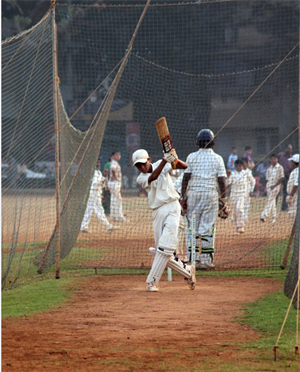
Cricket net practice
Ajit understood that people scrutinising Sachin closely would only make the little boy more nervous. When one is not subjected to pressure and expectations, they tend to play more carefreely. Ajit advised Achrekar sir to act as if he was not watching Sachin but to observe the game from a distance. This would ease Sachin's mind, who would exhibit his normal self and feel safe and at the same time lead to Achrekar sir witnessing his skills. True to Ajit's words, Sachin started batting really well, which made Achrekar sir to select him to his camp. This proved as one of the life-changing events in Sachin's life, as this was where his cricket journey started off.
Sachin had joined the camp of Achrekar sir with great difficulty and was proud of the fact. He was happy about this summer camp that he was ready to go through all the difficulties that it encompassed. The first major setback that he has faced was the distance between his home and the camp. He stayed in Bandra, and the camp was set in Sivaji park. Although both places were in Mumbai, it was forty minutes away from his home. He had to take public transport, and this further delayed the journey. He had his practice sessions in the morning from \(7.30\) to \(10.30\). It later resumed in the afternoon. Sachin had to therefore travel again for forty minutes back home, have lunch and again travel to the camp for the same duration in a bus. As an eleven-year-old child, this tired him out. His day started early in the morning and ended up late in the evening.
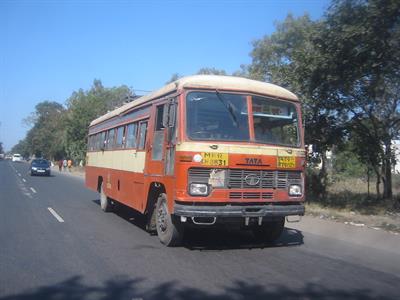
A bus in Mumbai**
Sachin's brother Ajit who was the main reason for joining the camp, proved as a moral support, as he accompanied Sachin during the travel during the first few years. He was a fan of cricket himself and therefore discussed the game during the commute. He accompanied his brother to get him accustomed to the route and routine as he understood that it was too much for a young child. He talked to Sachin about the nuances of batting and the game and even gave him a small note containing some batting tactics. Sachin recalls even after becoming one of the world's best batsmen that the small note proved to be a personal coaching manual.
Sachin notes that he had only one set of cricket clothes as he belonged to a middle-class family. It was difficult as he had to manage with the only set. He would come back from his morning practice and wash them. It would be dried under the sun when he had lunch. He would later wear them when he returned for his afternoon sessions. But the pockets of the clothes would be wet, as it was difficult for pockets to dry. He would later come back in the evening and rewash his clothes as they would get dirty due to the sweat and work in the ground. He played with wet pockets for a long time. But when one is striving to achieve something, all these trivial discomforts do not affect them. His hard work paid off as Achrekar sir recognised his talents and understood his potential. But when schools reopened, the school that Sachin was enrolled in did not give any prominence to cricket and did not have any facilities. Achrekar sir wanted him to change schools in order to practise persistently.
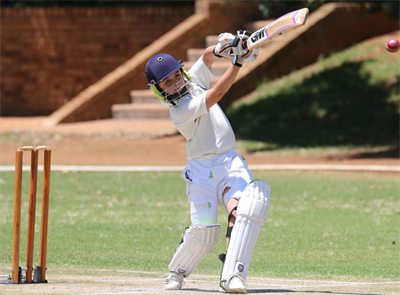
Boy playing wearing cricket clothes
Achrekar sir was keen on building Sachin's career, now that he had witnessed his potential for himself. But he also understands as a coach that external circumstances must not ruin one's chances of growing in the field. So he decided to address the issue and confront Sachin's father. It was draining Sachin out as he had to travel all the distance from his home to the camp, and he did not have any backup from his school. Achrekar wanted Sachin to be in his vicinity in order to keep an eye on his developments and also to train him efficiently. He, therefore, asks Sachin's father to transform him into the school where he worked as a coach. When a coach of his stature makes a request, one cannot deny it, and therefore, Sachin's father agrees, so does his brother Ajit.
Sachin's father was very particular that his efforts were not wasted and tells Sachin that the transfer of schools should not be futile and it had to be done only if he had any intention of taking cricket seriously, as the whole process happened only due to his love for cricket. Sachin, who was truly interested in the game, agreed and, true to his words, did not let him down. He, therefore, moved to Shardashram Vidhyamandir, where Achrekar Sir was the cricket coach. But his father never applied pressure saying that Sachin had to show results as he was transferred to the school as per his wish. He only wanted his son to do his best and put in all his effort instead of worrying about the outcome. Sachin, for his part, channelled all his saved up journey to the game.
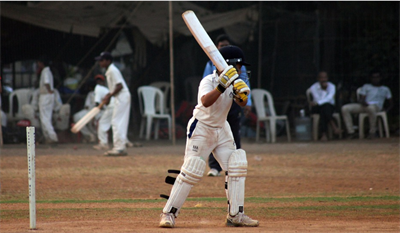
Young boys practising cricket
His days at the new school was fully packed as it started from \(7.30\) am and lasted till \(4.30\) pm. He had to continue practising after a half an hour break and resume by 5 in the evening. He would eat vada pav in the break with the money given by the coach. He played fifty-five practice matches during the summer break of sixty days, which shows that he spent nearly all his time playing the game. The practice session went on till 7 in the evening. The coach was an experienced person and knew that motivation is the key to any person's success. Young children like to be gifted and recognised. He, therefore, had a routine for the last 15 minutes of the session, where he would place a one rupee coin on the wickets. Bowlers from the camp would bowl to Sachin, and he had to be careful not to get out, with around sixty to seventy boys fielding to take a catch. The motive was not to make the coin fall on the ground. If he was stumped and got out, then it means he would not get the one rupee. Sachin focussed more on the game with extreme concentration as he now had a specific motive. Apart from this, he would have to run two rounds around the ground for physical fitness with his pad and gloves on.
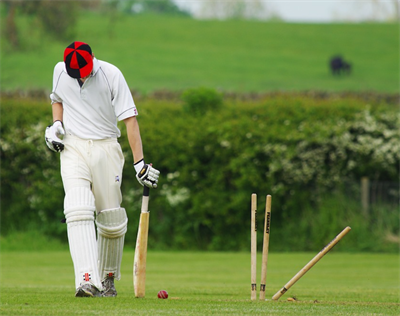
Ball hitting the stumps
Every person who strives towards achieving a goal has to face struggles of one's own. Similarly, Sachin had his own fair share of troubles before he became the God of cricket. His practice sessions were making him highly tired as it was too much for an eleven or twelve-year-old. His entire day was taken away by the sport, which required a lot of physical strain. He recalls as to how his father used to visit the ground occasionally to pick him up. This was a refreshing thing for a tired soul as it meant getting a little treat from his father. Sachin often used to demand a special fruit cocktail from the nearest shop to the club, as it would be refreshing after a hard day. But he did not realise that it was an added luxury to spend on such items as his family was from a struggling background, which already had to cater to the needs of 5 people. Despite all that, his father would give in and get him the juice, as it brought a smile to Sachin's face.

Fruit cocktail
Sachin emphasises on how hard it was to travel by bus after a day's practice. He had his cricket kit with him, and he boarded the bus after \(7\) pm, which was usually the peak hours. Mumbai is a metropolitan city that usually has crowded buses, especially during peak hours. He would rarely get a seat in the bus, which was a blessing as he would easily fall asleep after the tiring day. But most days, he would not be lucky enough and had to stand in the bus all the way home. He had his kit, which made it even more difficult for him as it took up the space. The bus conductors were rude to him as he was taking up the space of another passenger. The kit was heavy with all his equipment and was quite big too. He was asked to take the ticket for the luggage, which he was not able to afford. Initially, it was embarrassing to hear all the ridicule, especially since he often wore dirty clothes after hours of practice. But he soon got used to it and dodged those remarks. The kit soon became a part of him, and he got used to the routine, and he saw it as a learning experience.
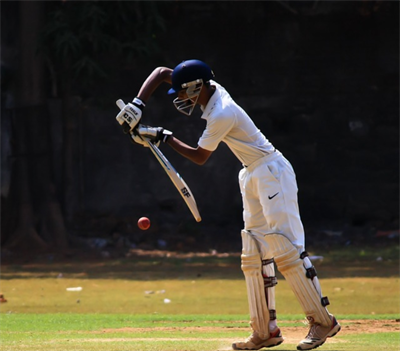
Boy batting wearing cricket kit
Although the practice session went well, Sachin cherished a game with his colony friends like good old times. He would occasionally skip net practise and play with his friends. But Achrekar sir was very strict and also determined to make him successful that he would take his scooter and find him playing, and drag him to the ground. Although Sachin would come up with excuses, he would have none of it as he was keen on getting him to go and practice cricket.
Sachin states that Achrekar sir was very strict when it came to keeping up the practice. When one is young, they do not realise the seriousness of life or the necessity to practise incessantly. Sachin, like any other young boy of his age likes to fool around and have fun with his friends. He is completely tired because of the practice, and therefore takes time off, going about his older routine. But as a coach, Achrekar has more experience as he had also started by eleven years old, like Sachin. He could empathise with Sachin because of this. He would drag Sachin out of the crowd of friends and take him back to the practice session.
Achrekar sir imparts his wisdom on Sachin as he sees the potential in him. He says that one must not waste time doing things that do not give any benefit in life. If Sachin were to play only in the streets, he would not have reached the position that he is now. He would have disappeared just like millions of other boys who did not know the right way to express or build their skills. Achrekar sir says that one must always utilise one's skills and project them in the right direction. So he asks Sachin to practice cricket in the right place, in the nets. He also says that if he practices in the right place, magic will transpire, such that his skills and efforts will be rewarded. He says that one must never while away time at a young age. It is the age to have a proper career orientation and work towards one's goals. When one chooses something that one enjoys the most, and it benefits other people and oneself, then all that one has to do is shape their personality accordingly. Being lazy, aloof and careless will not help achieve things. One has to accept that struggles and sacrifices are part of the journey.
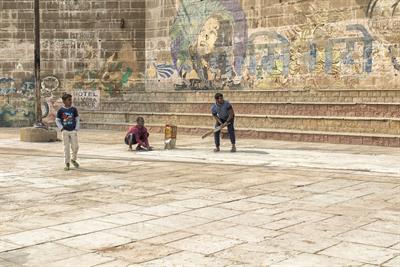
Gully cricket
Sachin was too young to understand this philosophy, but after being the world's best cricketers, he could only thank his coach for guiding him in the right direction. He had also been punished for skipping practice one evening to watch an inter-school cricket match, where he was not expecting his coach also to be present. Achrekar sir very clearly says that if he practices hard, other people would come and watch his match, and he would not have to go about watching and clapping for others. If not for his guidance, Sachin recalls that he would not have reached all these heights.
Reference:
- Sunil Gavaskar*: Bollywood Hungama, CC BY 3.0, via Wikimedia Commons
- A bus in Mumbai**: Yann Forget / Wikimedia Commons
